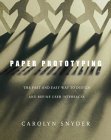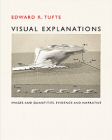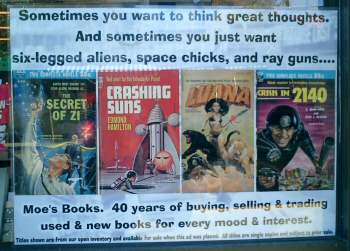About halfway through October news broke that award-winning crime author Robert Crais had filed suit against Activision, publishers of the forthcoming game True Crime: Streets of LA. Reports of the lawsuit seemed to be based on a press release from Activision, and a variety of newswire Chinese whisperings. Not exactly a set of concrete facts, but the common thread was that the suit centred on the character of Nick Kang, hero of the True Crime game. Robert Crais alleged that Nick Kang was a carbon-copy of Elvis Cole, the detective hero of most of his novels.
The case caught my attention for three reasons. First of all, I’m an enthusiastic videogamer. Secondly, I’m interested in matters concerning copyright and intellectual property. But most of all, I am a huge Robert Crais fan. LA Requiem is one of my all-time favourite books. The ending made me cry. Books don’t usually affect me that strongly.
My feelings about the case are mixed. At first, my heart sank. Looking at the USA from the outside, it appears increasingly (and depressingly) easy to bring a lawsuit for copyright violation, or trademark or patent infringement. The Recording Industry Association of America has recently been instrumental in giving such lawsuits a bad name by using them to extort money from copyright infringers who can’t afford the legal fees to defend the matter in court. Even when it’s not a matter of individuals trying to stand up to corporate juggernauts, such as in the case of SCO versus IBM, outsiders generally look at the case, see the enormous sums of money being claimed, and dismiss the plaintiffs as greedy opportunists.
When I thought of Robert Crais bringing suit against Activision for copying Elvis Cole, I thought of the hundreds of fictional detectives that crime writers have created in the twentieth century. How many tough guy detectives did Dashiell Hammett and Raymond Chandler spawn? How many amateur sleuths followed in the footsteps of Miss Marple, or Lord Peter Wimsey? Perhaps more so than any other genre, modern detective fiction relies on a common pool of characters, conventions, and expectations. The twentieth century detective has been shaped by the great authors in the field, and it would be almost impossible to construct (let alone market) a mystery that didn’t draw on this shared history. If authors started suing each other for creating characters that were too similar to their own, the crime genre would be dead within a year.
When I first started reading Robert Crais’s novels, I was struck by the similarity between Evis Cole and Joe Pike, and Robert B. Parker’s heroes, Spenser and Hawk. Spenser and Elvis Cole are both tough, wisecracking ex-cops with a crusader mentality. Hawk and Joe Pike are both strong, swift, deadly, don’t say much, and have a habit of showing up and providing life-saving assistance when Spenser and Cole need it most. Wow. They’re cut from exactly the same cloth. So did Crais rip off these characters from Parker? And if he did, is this a matter of paying homage to a master, or a matter for the courts?
There’s a blurry line here. On one side of it you have writers building on common archetypes to create original works, and to enrich the genre. On the other side you have situations where a derivative character is genuinely reducing the market value of the original. But as soon as you start talking about “market value,” you’re back in a grey area where the opportunity for overstatement is rife, and accusations of money-grubbing pop up like hyperactive meerkats. So even if there is a case to answer, the very action of pursuing it may be damaging to the plaintiff’s cause.
This seems to be what happened with Robert Crais. Shortly after the lawsuit was announced, the discussion forum on his web site had to be closed because of outraged videogame fans flooding the board with obscene messages and insults. If you have a look around the web for news of the lawsuit, you will run across large numbers of inflammatory postings and hateful comments attacking Crais for taking this action.
Where were the mystery fans standing up for their favourite writer? I couldn’t find any. They were probably silenced when the Robert Crais message board closed. It shouldn’t come as news to anyone that videogame fans vastly outnumber mystery fans on the internet.
But what is the opposite side of the issue? I said I had mixed feelings about the lawsuit. In fact, Crais himself summed it up in a posting he made to his fan mailing list:
‘A video game titled TRUE CRIME: STREETS OF LA was recently brought
to my attention. The creators of this game have admitted it was
patterned after my Elvis Cole/Joe Pike novels. Those of you long
familiar with my work know that I guard Elvis and Joe closely. You
know that I have turned down well over thirty offers to sell the
film and television rights to these characters and books. They are
not for sale. They may not be used without my permission.
‘To quote a character from THE MONKEY’S RAINCOAT, where it all began:
“He accepts the duty of protecting what is his.”‘
These characters are his. Crais has been very public about the fact that they are very close to his heart, and that he doesn’t want them abused or diluted by film or television. If he was in this for the money, he could have made heaps by selling the movie and TV rights. He hasn’t.
He is not precious about selling rights in general, though. In fact, one of his other novels, Hostage is apparently in pre-production right now with Bruce Willis in the lead role, and Crais himself writing the script. He is protective of Elvis Cole and Joe Pike specifically.
In proceeding with legal action against Activision, Crais could be perceived as trying to block them from bringing the game to market just so that he could make more money from selling the Elvis Cole game rights at a later date. But I really don’t think this is the case. I believe he is genuinely trying to protect his own characters, rather than trying to make a fast buck.
As a content creator myself, I understand this position and I am sympathetic to it. If I had a set of characters I had carefully nurtured for over ten years, I’d be protective too. If the developers of True Crime have admitted that they based the characters on Elvis Cole and Joe Pike, and never told Robert Crais about this or asked for his permission, then he has every right to be upset, and to try to stop the game from being published until he gets the situation sorted out.
I’m glad to say, though, that there appears to be a happy ending to the whole story. At the weekend, Robert Crais sent another message to his fan mailing list:
‘As reported in the last newsletter, I filed a lawsuit against
Activision, Luxoflux, and game designer Peter Morawiec based
upon Activision’s upcoming release of a videogame titled TRUE
CRIME: STREETS OF LA. This lawsuit was brought because of
several articles(1) and interviews published on gaming websites,
and what appeared to me to be similarities between the game and
my Elvis Cole/Joe Pike novels.
‘Activision’s and Luxoflux’s open and honorable response both
surprised and impressed me. They allowed me and my lawyers full
access to a special ‘unlocked’ pre-release version of the game,
provided a complete game ‘script,’ flowcharts of game action,
and provided all-important clarifications to statements that had
been attributed to Mr. Morawiec (turns out the guy was a fan of
my work, and was simply expressing his admiration). In short,
they did a damned fine job of defusing what could have been an
ugly situation.
‘Based upon our review of those materials, we have concluded that
Activision has not infringed upon my copyrights. Accordingly, I
have dismissed the lawsuit against all parties. I want to thank
Activision, Luxoflux, and Mr. Morawiec for the cooperative
nature in which they brought the case to a quick conclusion. Cynics please note: No money exchanged hands.
‘And, lastly, be advised that I spent several hours reviewing
this amazing game. It rocks.’
I’m glad that this was resolved without going to court. I’m glad that Crais was satisfied that his characters weren’t stolen. I’m glad that videogame fans who have been looking forward to playing True Crime won’t have to wait to get hold of it. I’m glad that the game’s developers won’t have to watch their hard work taken apart in court.
And yet…it bothers me that a matter like this came to lawyers at twelve paces. Why did Crais have to bring a lawsuit in the first place? Did he make informal inquiries at Activision, or did he go straight for the big guns? If he made informal inquiries, did Activision refuse to answer them satisfactorily, so that he had to force disclosure through legal action? If Activision was so “open and honorable” after the lawsuit was filed, why were they unable to resolve the whole issue before it got to that point? Is Crais’s message a true reflection of an amicable settlement, or is it pure spin to try and hide a potentially embarrassing retreat after a too-hasty legal attack? Even though no money changed hands, I’m sure that the terms of the settlement will prevent both parties from discussing the matter any further.
Like I said: mixed feelings. I can see both sides of the issue. I’m glad that both parties appear to have walked away happy. But the very use of lawsuit tactics is going to gnaw at me for some time.
Related Links








